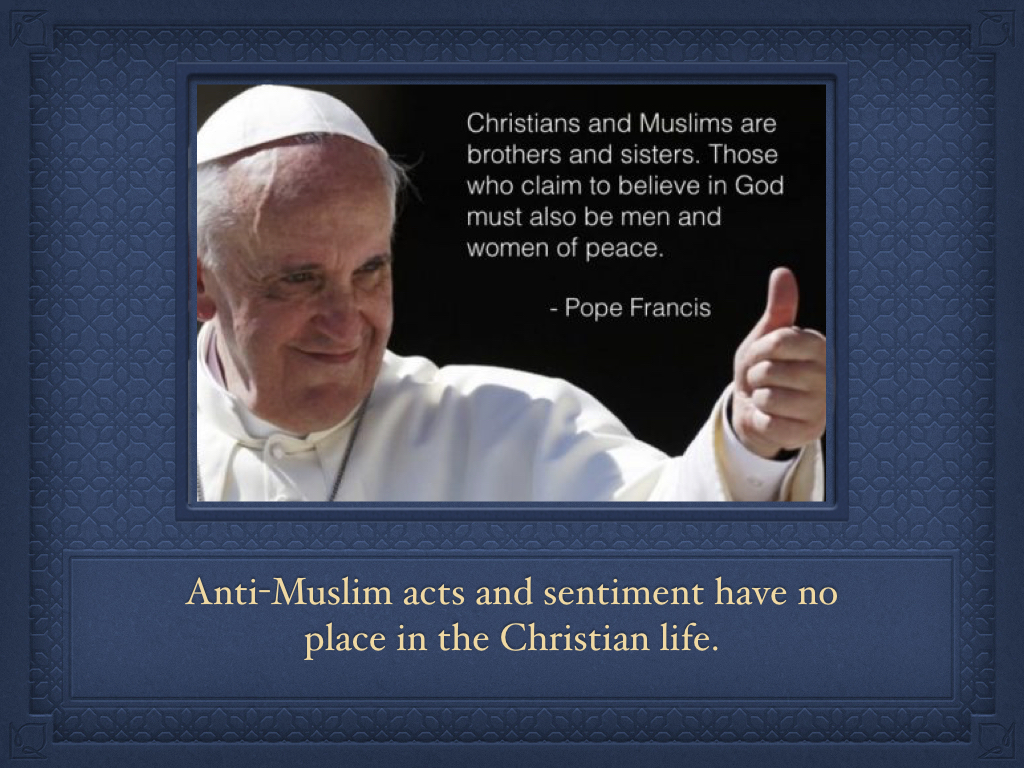
Anti-Muslim acts and Sentiment have no Place in the Christian Life
by Christopher Dodson
Executive Director
North Dakota Catholic Conference
February 2018
Let us not beat around the bush. Anti-Muslim acts and sentiment have no place in the Christian life.
For that matter, neither does anti-semitism, racism, ethnocentrism, and nationalist exceptionalism. It is, however, anti-Muslim viewpoints that most often creep into Facebook posts, tweets, conversations, and even legislation without challenge.
The Church’s teaching on Islam is clear. Saint John Paul II expressed the teaching of Vatican II when he said: “We believe in the same God, the one God, the living God, the God who created the world and brings his creatures to their perfection. . .” This does not mean that Islam is equal to the Catholic faith. The fullness of the faith is contained within the Catholic Church and her evangelical mission extends to all. It does mean, however, that we must reject claims that Muslims worship a different god. In fact, the very notion is illogical within the Christian understanding of who is God.
The Gospel is also clear about the dignity of all human persons. It calls us to a new way of life, one that rejects separation and respects the inherent human dignity that exists in all persons by virtue of being a child of God. That dignity is not dependent upon a person’s religion. Muslims, like Christians, have the same inherent rights to life, basic needs, family, education, work, peace, migration, and practice of religion. Indeed, the Church teaches that “any discrimination against people or any harassment of them on the basis of . . . religion” is “foreign to the mind of Christ.”
Catholic Christians either know this or should know it intuitively. We would like to think that no Christian would publicly defend racist ideologies or acts. Why, then, do we tolerate or justify discrimination toward Muslims?
Some communities have worked to prevent the building of mosques. People have protested when Muslim students are given space for daily prayers. We have seen calls to ban Muslims from immigrating to the United States. Even some North Dakotans have supported banning recognition of all “religious laws” as part of an effort to prevent Islamic practices, despite the fact that such legislation is unneeded and “slap in the face” of our constitutional principles. People take to Facebook to scorn the practice of head covering but are, for good reason, upset when schools ban the carrying of rosaries. Why the double standard?
The history of relations between Christian and Muslim nations is complicated and marked by hostilities and conflicts. It contributes to sense of distrust. In our own time, we have seen terrorist attacks by the so-called Islamic State, Al-Qaeda, Taliban, and lone wolves claiming to act in the name of Islam.
Meanwhile, immigration by choice and forced migration from war and persecution have brought Muslims from different countries and backgrounds to the United States. Some people see some of the cultural practices common in Muslim majority countries as strange and even incompatible with American life. Finally, we cannot discount that too many people believe the false stories about Islam, Muslims, and Sharia law that circulate on the internet.
Christians, however, must never discriminate against a people. “Avoid giving offense, whether to Jews or Greeks or the church of God,” said Saint Paul. Today, we could substitute “Muslims” for “Greeks.”
The first Christians were Jewish and were raised and immersed in a world of not only Jewish laws and rituals, but also a social and political culture infused with a sense of separateness from, if not distrust of, the non-Jewish (Greek or Gentile) world. The Holy Spirit, however, revealed to them that Christ came for all, the Jew and the Greek. Acceptance of the old law by Gentiles was not necessary for salvation.
Theology, however, is one thing. Practice and culture is another. Jews and Gentiles usually did not eat meals with each other. When Peter was in Antioch he ate with the Gentiles, respecting the equality of all revealed by Christ. When Jewish Christians arrived, however, he retreated to his old ways. One by one, other Christians followed. Even Barnabas who, with Paul, primarily preached to the Gentiles, joined Peter in the act of separation.
Some scholars, including Pope Benedict XVI, think that Peter was driven by a desire not to offend the Jewish Christians. From Paul’s perspective, Peter “drew back” and “separated himself, because he was afraid of the circumcised.” Whether it was because of fear, retreat to habit, or political compromise to the Jewish Christians, what Peter did was seen by Paul as inconsistent with what had been revealed to them by the Holy Spirit and an act of hypocrisy. Paul publicly called him on it.
The question before us is whether we will, like Peter and Barnabas, slip into ways of tribalism or will we, like Paul, remind our brothers and sisters of the new, better, and true way of Christ?
What We Do
The North Dakota Catholic Conference acts on behalf of the Roman Catholic bishops of North Dakota to respond to public policy issues of concern to the Catholic Church and to educate Catholics and the general public about Catholic social doctrine.

Contact Us
North Dakota Catholic Conference
103 South Third Street, Suite 10
Bismarck, North Dakota
58501
1-888-419-1237
701-223-2519
Contact Us

